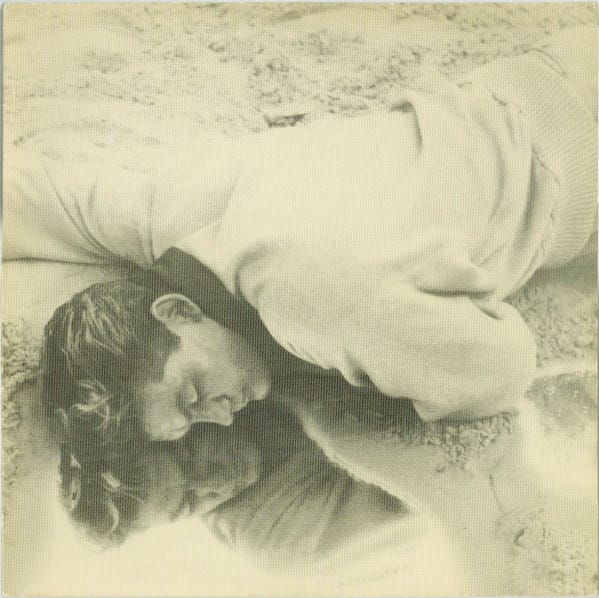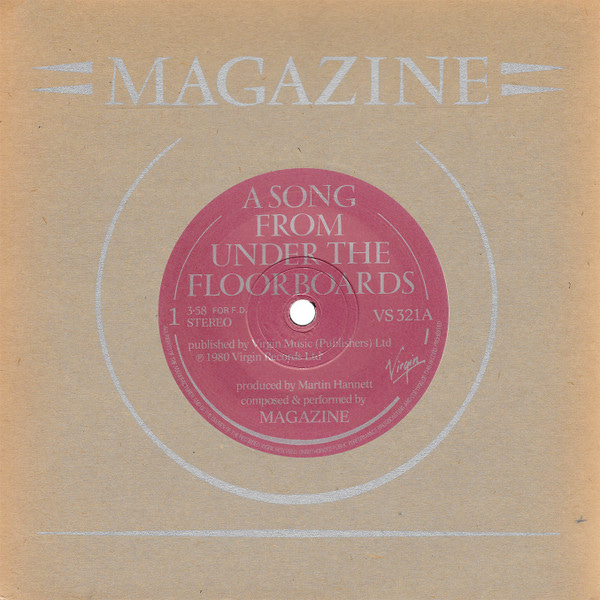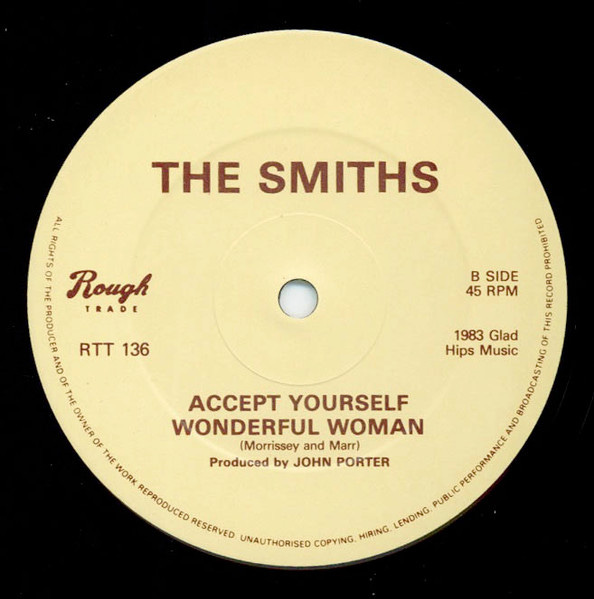"Accept Yourself"
Written circa April 1983, “Accept Yourself” was one of several songs that the Smiths recorded themselves in a rehearsal room above their manager Joe Moss’s Crazy Face shop in Manchester in May 1983, as part of their preparations for recording their anticipated first studio album. This recording eventually surfaced long after the Smiths disbanded, becoming known as the Pablo Cuckoo tape1.
Once signed to Rough Trade Records, the Smiths went on to record two different versions of the song with producer Troy Tate in the summer of 1983 at London’s Elephant Studios, during the course of their ill-fated sessions for their debut album. As with the other tracks the band recorded with Tate, neither Morrissey nor Marr were satisfied with his production methods (described by Morrissey in Autobiography as “a rash rumble coming from the speakers”).
As Morrissey later related, “It is not Troy’s fault, but recording does not go well, and we all feel that we must have another shot at it […] Geoff (Travis, owner of the Smiths’ record label, Rough Trade) agrees that the LP must be right and must be improved upon from the Troy sessions.”
Another version of the song was recorded on 25 August 1983 as part of the Smiths’ setlist for their second appearance on David Jensen’s BBC 1 radio program2. This session fortuitously marked the band’s first meeting with John Porter, who produced the songs for the broadcast, which aired on 5 September 1983.
Finally, the definitive version of “Accept Yourself” was recorded in September 1983 at Matrix Studios in London with John Porter, whom the Smiths had chosen to produce their debut album. Although the song was not included on the Smiths’ eponymous debut album when it was released the following February, it appeared as the B-side to the 12-inch edition of the band’s second single, “This Charming Man.”3

The David Jensen radio session version of the song first appeared on the Smiths’ initial compilation album, Hatful of Hollow, released in November 1984. The definitive Porter studio version appears on the CD edition of the compilation The Smiths Singles Box (released in June 2009), while the David Jensen session version is also included on the compilation Complete (released in 2011).
Morrissey’s lyrics on “Accept Yourself” appear to be influenced by “A Song From Under the Floorboards”, a track by Magazine, a Manchester band formed by former Buzzcocks singer Howard Devoto4 in 1977. Along with a similar lyrical line, “Accept Yourself” shares the ethos of the Magazine song to a striking degree.
Magazine → “I am angry, I am ill, and I’m ugly as sin”
Morrissey → “I am sick and I am dull and I am plain”
“A Song From Under the Floorboards” expresses a defiant self-awareness: its narrator accepts his flaws and alienation with ironic pride (“the brightest jewel inside of me / Glows with pleasure at my own stupidity”). Far from seeking redemption, the protagonist celebrates his flawed, lowly status (“I am an insect / I have to confess I’m proud as hell of that fact”).
While “Accept Yourself” doesn’t directly mirror Magazine’s song, it certainly echoes it - albeit from a more nuanced perspective. The line “When will you accept your life / The one you hate?” conveys a tone not of surrender but of sober recognition: the realization that “dreams have a knack of just not coming true.” Rather than a triumphant anthem of self-empowerment, Morrissey offers a melancholic acknowledgment of life’s imperfections, and perhaps a glimpse into the painful process of self-realization: “Anything is hard to find / When you will not open your eyes.”
One can ignore reality in countless ways, as many do, or open their eyes and embrace the self. Some circumstances cannot be changed, yet the path toward anything better cannot be illuminated without first seeing - and accepting - who and what we are.
Built around bright, interlocking arpeggios, the music of “Accept Yourself” feels oddly upbeat given its lyrical themes. Its circular, meditative progression reinforces a mood of self-confrontation. Morrissey’s vocal delivery is almost conversational, eschewing flamboyance in favor of plaintiveness and underscoring the song’s introspective character.
Written around the same time as “I Don’t Owe You Anything” and “You’ve Got Everything Now”, “Accept Yourself” is not generally regarded as one of the Smiths’ stronger tracks. While opinions inevitably vary, it feels like the product of a band still in the process of finding its lyrical and musical footing - a song that falls just short of true B-side quality. Yet despite its unevenness, the track possesses a quiet, enduring worth: it is both deeply personal and broadly relatable, an understated anthem for anyone struggling to find peace within themselves.
The tape, running just over 39 minutes in length, contains nine songs, including some of the earliest tracks written by Morrissey and Marr:
-You’ve Got Everything Now
-Accept Yourself
-What Difference Does It Make?
-Reel Around The Fountain
-These Things Take Time
-I Don’t Owe You Anything
-Hand In Glove
-Handsome Devil
-Miserable Lie
Sometime in 1997, the party in possession of the tape (known under the alias “Pablo Cuckoo” to protect their identity) shared the cassette with a third party, who then transferred the recording onto DAT before returning it to its owner. In March 2013, the transferred tape was leaked on the internet with the expectation that this would prompt its formal release. However, the poor sound quality of the recording, coupled with emerging legal threats from the record company, prevented any such release.
A source with inside knowledge indicates that the songs compiled on the Pablo Cuckoo tape were not recorded in a single session. Rather, The Smiths ran through the set several times, with a different cassette used for each take. It is likely that all involved in the taping of these songs above the Crazy Face shop possessed one or more of these various tapes. Mike Joyce has indicated that he still has at least one of them in his possession.
The Smiths initially appeared on Jensen’s radio program in July 1983.
The single was released 28 October 1983, reaching number 25 on the UK Singles Chart. “This Charming Man” was re-released as a CD single in two editions in the UK in August 1992.
Howard Devoto (born Howard Andrew Trafford, 15 March 1952) is an English singer and songwriter. Devoto launched his career as the front man for the Buzzcocks in 1976. He left the band in 1977 to form Magazine. Devoto went solo after Magazine disbanded in 1981, and later formed indie band Luxuria.



